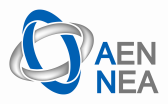


SEMINAR ON TRANSFER OF COMPETENCE, KNOWLEDGE AND EXPERIENCE GAINED THROUGH CSNI ACTIVITIES IN THE FIELD OF THERMAL-HYDRAULICS
Hotel Flamenco, Budapest - Hungary
June 27 - July 1, 2016
June 27 - July 1, 2016
INTRODUCTION
The Committee on the Safety of Nuclear Installations (CSNI) of the OECD Nuclear Energy Agency (OECD-NEA) proposes to hold a seminar for transferring competence, knowledge and experience gained through CSNI activities in the field of thermal-hydraulics. The seminar organisation will build on the experience gained with the THICKET seminars conducted in the thermal-hydraulic area in 2004, 2008 and 2012.
The seminar will be organised jointly by the Centre for Energy Research of the Hungarian Academy of Sciences (MTA EK) and the OECD Nuclear Energy Agency (NEA) and supported by the European Commission (EC).
Objective of the Seminar
To transfer to specialists unfamiliar with CSNI activities, and to newcomers in the field, competence and experience acquired from activities carried out in the framework of CSNI during the last two decades, through activities such as State-of-the-Art Reports, Computer Code Validation Matrices, investigations of user effects, studies on uncertainty methods, International Standard Problem exercises, specialist workshops, etc. Managers and research planners would also benefit from attending the seminar. Relative to previous THICKET courses, the course content has been updated with recent activities [e.g., Best-estimate Methods Uncertainty and Sensitivity Evaluation (BEMUSE and PREMIUM), Computational Fluid Dynamics (CFD) including the Best Practice Guidelines and related benchmarks, the Safety Margin Assessment and Application (SM2A) and Spent Fuel Pool accident activity] as well as new developments from thermal-hydraulic OECD Projects.
Expected benefits
- Most achievements of the CSNI are documented in dispersed reports that may not provide a coherent overall picture of current technology. Moreover, some CSNI reports have not received a wide distribution.
- The Seminar will provide good transfer of knowledge summarised in CSNI documents to a wide nuclear safety community.
- It will provide good transfer of experience and know-how from recognised experts who have been associated with CSNI activities since a long time.
- It will contribute to maintaining and increasing competencies, and to ensuring sustainable development of nuclear safety technology.